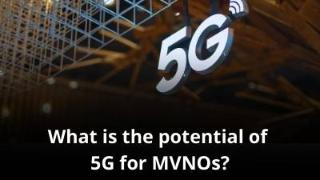Introduction Artificial Intelligence (AI) & your Mobile Brand
Artificial Intelligence (AI) is reshaping the landscape for mobile brand and Mobile Virtual Network Operators (MVNOs), serving as a strategic catalyst for innovation. In this dynamic space, AI enhances customer experiences through personalized marketing and efficient chatbot-driven customer service. Its influence extends to optimizing network performance, predicting issues, and enabling dynamic pricing for personalized plans.
For Mobile Brands and MVNOs, leveraging Artificial Intelligence (AI) is not just a technological upgrade but a key strategy to stay competitive, offering innovative and personalized services to subscribers. You should include AI in your Business, Marketing and Financial plan.
What do you need to know about AI for your MVNO
- Which different types of AI are there?
- What is the future of AI for an MVNO?
- AI Personalized Marketing and Recommendations
- Chatbots and Virtual Assistants
- Predictive Analytics for Customer Insights
- AI-powered Customer Service Automation
- Fraud Detection and Security
- Voice Assistants and Natural Language Processing (NLP)
- Dynamic Pricing and Personalized Plans
- Customer Journey Optimization
- Network Optimization and Quality of Service
- Data Security and Privacy Compliance
- Summary
- Frequently Asked Questions (FAQs)
Of course you should be be aware of some of the Do’s and Don’ts and Pros and Cons of Artificial Intelligence (AI).
Which different types of AI are there?
There are many different types of AI, and the list and options are growing very fast. Let’s highlight the AI terms that are particularly relevant and interesting for Mobile Brands, MVNOs, and MVNEs. These AI concepts cater specifically to the needs and challenges faced by Mobile Brands, MVNOs, and MVNEs. From enhancing customer interactions to optimizing network performance, these technologies offer strategic advantages in a dynamic and competitive mobile industry.
The AI types are:
- Predictive Analytics: Employing AI algorithms to analyze user behavior, anticipate trends, and forecast subscriber needs. Mobile brands can use predictive analytics for personalized marketing strategies and proactive customer engagement.
- Dynamic Pricing: Utilizing AI for real-time analysis of market conditions and user behavior to adjust pricing dynamically. Mobile brands and MVNOs can offer personalized plans and promotions based on individual usage patterns, enhancing subscriber satisfaction and loyalty.
- Chatbot: AI-powered chatbots for instant and efficient customer support. Mobile brands can deploy chatbots to streamline interactions, address routine queries, and enhance the overall subscriber experience.
- Reinforcement Learning: Exploring reinforcement learning for optimizing mobile services and subscriber interactions. This could include AI-driven strategies for content recommendation, personalized offers, and service improvements.
- Edge Computing: Implementing edge computing for local processing of data on mobile devices, reducing latency and enhancing the efficiency of AI applications in real-time scenarios.
- IoT (Internet of Things): Leveraging AI in IoT applications for mobile networks. This includes using AI for data analysis, predictive maintenance of IoT devices, and optimizing connectivity for diverse IoT applications.
- Federated Learning: Exploring federated learning for collaborative model training across multiple devices or networks without sharing raw data. This can enhance the personalization of services while respecting privacy.
- Transfer Learning: Applying transfer learning to mobile services to leverage knowledge gained from one task for improved performance in related tasks. This can enhance the efficiency of AI models in diverse mobile applications.
- Robotic Process Automation (RPA): Employing AI-driven RPA for automating repetitive tasks in mobile network management, customer support, and operational processes.
- Network Optimization: Utilizing AI algorithms for continuous monitoring and optimization of mobile networks. This ensures a consistent quality of service, proactive issue resolution, and efficient resource allocation.
What is the future of AI for an MVNO?

The future of AI for Mobile Virtual Network Operators (MVNOs) is ready to revolutionize the industry, promising a landscape marked by greater subscriber experiences and operational efficiency. AI will evolve to tailor services at an unprecedented level, offering subscribers personalized plans, content recommendations, and interactive experiences. Advanced predictive analytics will empower MVNOs to not only anticipate subscriber needs but also make informed, real-time decisions, optimizing service offerings and driving strategic business decisions. The synergy between AI and 5G technology will be a key enabler, unlocking new possibilities for richer and more involved subscriber experiences.
AI has the potential to be used to develop new revenue streams for MVNOs, such as targeted advertising and personalized data analytics. By analyzing subscriber data, MVNOs can identify patterns and insights that can be used to target advertising campaigns more effectively. This data can also be used to provide subscribers with personalized insights and recommendations, which could lead to increased customer satisfaction and loyalty.
Moreover, AI’s role in network optimization will become increasingly sophisticated, ensuring consistent and adaptive performance by continuously learning from changing usage patterns. Automation will extend across various MVNO operations, freeing resources for strategic initiatives and enhancing overall efficiency. As the industry embraces ethical AI practices and security measures evolve, MVNOs will navigate the future landscape with a commitment to transparency, fairness, and responsible AI development. The symbiosis of AI and MVNOs promises not just innovation but a paradigm shifts towards a more intelligent, responsive, and subscriber-centric mobile ecosystem.
AI Personalized Marketing & Recommendations
AI-powered personalized marketing begins with the analysis of extensive your Mobile Subscriber data, including past purchases, preferences, and engagement patterns. With Artificial Intelligence machine learning algorithms, a mobile brand can create detailed customer profiles and predict future behavior. This allows hyper-targeted marketing campaigns, where promotions and content recommendations align precisely with individual subscriber interests. For instance, if a subscriber frequently engages with fitness-related content and purchases fitness apps. AI can suggest personalized offers for health and wellness services like a smart watch measuring the heartbeat. This level of personalization not only increases the likelihood of user engagement and upsell for you. It also creates a sense of connection and loyalty between the mobile brand and its subscribers.

Moreover, AI can dynamically adjust marketing based on real-time data, allowing mobile brands to respond swiftly to changing preferences. If a subscriber’s behavior indicates a shift in interests, AI algorithms can adapt promotional content accordingly. This flexibility ensures that marketing efforts remain relevant and resonate with users over time. In essence, AI transforms marketing from a generic broadcast approach to a nuanced, personalized interaction that enhances the subscriber experience.
Chatbots and Virtual Assistants
AI-powered chatbots and virtual assistants are at the forefront of transforming customer support for mobile brands. These intelligent systems utilize advanced Natural Language Processing (NLP) to the questions of subscribers and provide contextually relevant responses. Chatbots, integrated seamlessly into websites, apps, or messaging platforms. And offer subscribers immediate access to information and support, creating a more convenient and efficient customer service experience. For instance, a mobile subscriber seeking assistance with a billing inquiry can interact with a chatbot. The Chatbot understands and addresses the specific query, reducing the need for time-consuming human intervention.
Beyond routine inquiries, AI-driven virtual assistants can handle more complex interactions. Through machine learning, these systems continuously improve their understanding of user intent and refine their responses based on historical interactions. This learning process contributes to increasingly sophisticated and accurate support capabilities. Additionally, virtual assistants can guide users through troubleshooting processes, recommend solutions, and provide instructions, offering a unique support experience.
Overall, the integration of AI-powered chatbots and virtual assistants streamlines customer service operations, enhances responsiveness. Resulting in and contributing to a more satisfying subscriber journey. In addition to streamlining customer support interactions, AI-powered chatbots can also be used to proactively engage with subscribers. For example by sending personalized notifications or suggestions. This could include alerting subscribers to new promotions, recommending relevant content, or providing help with troubleshooting issues.
Predictive Analytics for Customer Insights

Predictive analytics powered by Artificial Intelligence involves the use of sophisticated algorithms to analyze historical customer data. As well as making predictions about future behavior for a Mobile Brand. Mobile brands can leverage the insight with Artificial Intelligence to anticipate subscribers’ needs, forecast trends, and even predict potential churn. By identifying patterns in user behavior, such as usage patterns, preferences, and engagement history, brands can tailor their strategies. And therefore proactively address customer concerns, offer personalized incentives, and ultimately enhance customer satisfaction.
Moreover, predictive analytics can help product/service development by forecasting demand and guiding innovation based on anticipated customer requirements. By staying ahead of customer needs, mobile brands can position themselves as proactive and customer-centric, fostering stronger relationships with their subscriber base.
AI-powered Customer Service Automation
AI-driven automation revolutionizes customer service for mobile brands by automating routine tasks and interactions. From account management to billing inquiries, these systems use machine learning to understand and respond to user queries. The continuous learning capabilities of AI ensure that these automated responses become increasingly accurate and aligned with user expectations over time. Consequently leading to a more efficient and consistent customer service experience.
This automation extends beyond mere responses, incorporating functionalities such as automated issue resolution and real-time updates. For instance, AI can automatically troubleshoot common technical problems or provide status updates on service disruptions. Hence minimizing the need for direct human intervention. The result is a reduction in response times. As well as the ability to scale customer service operations effectively to handle a larger volume of inquiries.
Artificial Intelligence Fraud Detection & Security
AI plays a crucial role in bolstering the security of mobile services by using advanced algorithms for fraud detection. Machine learning models analyze user behavior patterns, transaction history. In addition to other relevant data to identify anomalies that could indicate potential security threats. For example unauthorized access or SIM card fraud. This proactive approach allows mobile brands to detect and respond to security incidents in real-time, safeguarding subscriber accounts/information.

Furthermore, AI enhances security measures through continuous learning. As the system encounters new patterns and emerging threats. It adapts and updates its algorithms to stay ahead of potential risks. This adaptability ensures that mobile brands remain resilient in the face of evolving cybersecurity challenges. Resulting in growing confidence in subscribers regarding the safety and integrity of their mobile services.
Voice Assistants and Natural Language Processing (NLP)
The integration of AI-driven voice assistants and Natural Language Processing (NLP) transforms user interactions with mobile devices. These systems enable users to engage with their devices using natural, conversational language, providing a hands-free and intuitive experience. NLP algorithms allow voice assistants to comprehend user intent, context, and nuances, facilitating more sophisticated and context-aware interactions.
Voice assistants enhance user convenience by enabling a wide range of tasks through voice commands. Such as setting reminders and sending messages to conducting web searches and controlling smart home devices. As AI continually refines its understanding of user speech patterns, the accuracy and efficiency of voice interactions improve, contributing to a more seamless and user-friendly experience for mobile subscribers.
Artificial Intelligence Dynamic Pricing & Personalized Plans for a Mobile Brand

Dynamic pricing strategies, powered by AI, involve the real-time analysis of various factors, including user behavior, market conditions, and competitive pricing. This data-driven approach enables mobile brands to dynamically adjust pricing and offer personalized plans based on individual subscriber usage patterns and preferences. AI algorithms continually analyze these factors, ensuring that pricing remains optimized to meet both the needs of subscribers and the revenue goals of the mobile brand.
Additionally, AI-driven personalized plans go beyond traditional pricing models, considering subscriber behaviors such as peak usage times, preferred services, and historical spending patterns. This level of personalization not only enhances subscriber satisfaction by providing tailored offerings but also contributes to improved customer retention and loyalty.
AI can not only be used to adjust pricing based on real-time market conditions and user behavior but also to predict subscriber churn and identify opportunities to cross-sell or upsell products and services. This could involve offering special discounts or promotions to subscribers who are at risk of churn, or suggesting additional services that would be of interest to them based on their usage patterns.
Artificial Intelligence Customer Journey Optimization for a Mobile Brand
Artificial Intelligence contributes to the optimization of Mobile Brand for the entire customer journey by analyzing user interactions, preferences, and pain points at every touchpoint. Through machine learning algorithms, mobile brands can identify areas for improvement, streamline processes, and enhance overall user experience. This involves a holistic approach, addressing not only individual interactions but also the seamless flow of the entire customer journey across various platforms and channels.
For example, AI can analyze user feedback, app usage patterns, and responses to marketing campaigns to refine onboarding processes, optimize app interfaces, and personalize user interactions. By understanding and adapting to the unique journey of each subscriber, mobile brands can create a cohesive and engaging experience that builds brand loyalty and positively influences the overall perception of the brand.
AI can be used to gain a deeper understanding of each subscriber’s unique needs and preferences, and then use that information to personalize their mobile experience at every touchpoint. This could involve tailoring the marketing messages they receive, recommending the most relevant content, and providing the most helpful support based on their specific context.
Network Optimization and Quality of Service
AI-driven network optimization involves the continuous monitoring and analysis of network performance data. By employing machine learning algorithms, mobile brands can predict potential issues, optimize resource allocation, and ensure a consistent quality of service for subscribers. This proactive approach enhances network reliability, reduces downtime, and contributes to a seamless and reliable connectivity experience.
Mobile brands can use AI to dynamically allocate resources based on factors such as user density, location-based demands, and data usage patterns. This adaptive resource allocation ensures that the network can effectively handle fluctuations in demand, providing subscribers with reliable and high-quality service, particularly during peak usage times or in areas with high user concentrations.
AI can be used to optimize network capacity for specific applications, such as video streaming or gaming. This would involve analyzing usage patterns and identifying times when certain applications are experiencing higher demand. AI could then be used to allocate network resources more efficiently during those times, ensuring that subscribers have a seamless experience with the applications they use most frequently.
Data Security and Privacy Compliance
AI is a critical component in enhancing data security for mobile brands by detecting and mitigating potential security threats. Machine learning models continuously analyze patterns in user behavior, identifying anomalies that could indicate security breaches, unauthorized access, or fraudulent activities. This proactive approach allows mobile brands to respond swiftly to emerging threats, safeguarding subscriber accounts and sensitive information.

Furthermore, AI assists in ensuring compliance with privacy regulations by automating data governance processes. This includes monitoring and managing access to sensitive data, implementing encryption protocols, and conducting regular audits for privacy compliance. By integrating AI into data security measures, mobile brands can not only enhance the protection of customer data but also build trust by demonstrating a commitment to privacy and regulatory compliance.
In addition to using encryption and anonymization to protect customer data, AI can also be used to detect and prevent security breaches. Machine learning models can be trained to identify anomalies in user behavior or network traffic that might indicate a potential breach or attack. AI can also be used to automate data governance processes, such as monitoring access to sensitive data and conducting regular audits for privacy compliance.
Summary
In summary, as the mobile industry continues to evolve, artificial intelligence (AI) presents itself as a powerful tool that can empower mobile virtual network operators (MVNOs) to not only stay competitive but also thrive. AI offers a multitude of benefits for both subscribers and MVNOs.
By personalizing marketing and customer service experiences, AI can foster stronger customer relationships and brand loyalty. Additionally, AI’s capability to optimize network performance and predict customer churn empowers MVNOs to make data-driven decisions that ensure a high-quality service for their subscribers.
Frequently Asked Questions (FAQs)
What role does artificial intelligence (AI) play in a mobile brand strategy?
AI enhances mobile brand strategies by automating customer support, personalizing offers, predicting churn, optimizing pricing, and improving user experience. By leveraging data intelligence, mobile brands can make faster, smarter decisions and deliver more relevant services to subscribers.
How can AI improve customer engagement for mobile subscribers?
AI improves engagement through personalized messaging, predictive analytics, contextual offers, and in‑app recommendations. Chatbots and virtual assistants provide instant support, while behavioral insights help tailor promotions and reduce churn.
Can AI reduce operational costs for MVNOs and mobile brands?
Yes. AI automates routine tasks such as billing inquiries, fraud detection, network optimization, and customer care. This reduces manual workloads, improves accuracy, and lowers operational expenses while maintaining service quality.
What types of AI technologies are used in mobile brands?
Common AI technologies include machine learning models for churn prediction, natural language processing for chatbots and voice assistants, recommendation engines for personalized offers, and real‑time analytics for dynamic pricing and network performance improvements.
How does AI help with customer support for mobile subscribers?
AI enables automated support channels like chatbots, virtual assistants, and self‑service interfaces. These handle common questions, guide users through tasks, and escalate complex issues to human agents, improving speed and satisfaction.
Is AI only useful for large mobile brands and operators?
No. AI is increasingly accessible through cloud‑native and SaaS platforms, allowing MVNOs, fintech mobile brands, and digital‑first operators to adopt AI for analytics, automation, and personalization without heavy upfront investment.
How can mobile brands start integrating AI into their operations?
Mobile brands can begin by identifying high‑impact use cases, such as customer support automation, churn prediction, or personalized marketing. Partnering with AI vendors, using AI‑ready platforms, and leveraging data governance frameworks accelerates adoption.











